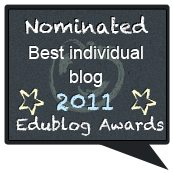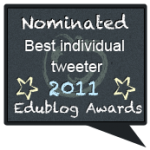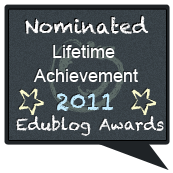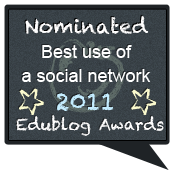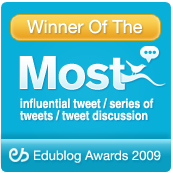I was somewhat disturbed about a recent post by a friend and connected colleague concerning the state of Twitter and its use by some individuals in what is now fast becoming the education social media culture. My friend seemed to be longing for the “good ole days” of Twitter when it was smaller numbers and people knew their place in their interacting with others. I remember those days as well, since I was on Twitter years before my friend. I think my perspective and take-aways on this are a little different.
I see the benefits of having a collaborative tool like Twitter to improve the profession of teaching. Twitter enables educators to easily and quickly exchange content in the form of links to other educators. The very things that need to be exchanged for collaboration include: articles, posts, movies, podcasts, websites, whitepapers, videos, interviews, and now even books. Twitter is not the format that one uses for exchanging ideas requiring deep thought and reflective exchanges. Twitter does however enable educators to drive traffic to places where those exchanges may take place. I personally do not consider Twitter as a form of Professional Development, but rather a bulletin board that directs folks to the places that they can get personalized professional development. It is that ability for educators to self-direct their intellectual growth and skill improvement that has led me to push to grow this social media culture for many years now.
Back in the day before Twitter there was little transparency in education. Teachers were trained in education courses from colleges, many of which were slow to change from 19th and 20th century models of teaching. They were then placed in a job that was governed by the culture of the school to which they were assigned. Collaboration, to whatever level it existed, was limited to a building or district. Those educators who were invited to attend them attended education conferences. It was also a matter of whom the budget allowed for conference attendance. The speakers at these conferences were often administrators who brought along their lead learners to share their best and most progressive lessons in sessions with others. Keynotes or highlighted session speakers were often celebrities, authors, administrators, consultants, vendors, or even politicians. Social Media has changed that for educators. Educators, many of whom gained prominence by sharing with others through social media, are dominating today’s conferences.
Sharing Is Not Bragging. The whole condemnation of self-promotion is a little ridiculous since to a degree everyone on social media self-promotes in order to get their message out to a larger audience. Using your voice to a limited audience seems counter productive. There are some who do it too often, but it is a public platform. We can’t regulate what others tweet. Of course the irony of many bloggers writing about, or condemning self-promotion is that they often self-promote within their own blogs or tweets to drive traffic to their posts. It is the best way to share ideas with a larger audience. Yes, there are “Rock Star” educators on Twitter, but that more often comes from sharing great ideas. If I might indulge in some self-promotion here; I direct you to A Rock Star, not by choice.
I hate that we have, what I refer to as, Drive-by presenters at conferences. They fly in for a session or keynote and fly out immediately after their delivery. The fact of the matter is that they did share needed info with a larger audience and as much as I hate their not sharing further with more personal interactions with conference participants, they do offer what people often need to hear. That is the goal we want to achieve.
My friend also seemed to be down on those who only RT tweets. Re-Tweeting serves several purposes. First it allows novice tweeters to somewhat engage in Twitter as they learn the culture. I RT frequently when I find great tweets so that my followers, who may not have gotten that tweet, may benefit from it. Yes, there are some who never get beyond the RT phase of tweeting, but that is their choice and loss. We need not judge them for that. I also discovered the power of an RT lies in how good the original Tweet is. If one RT’s really smart Tweets from really smart people, She/he is credited for that tweet and those smarts, as well as the original tweeter. It does build a following, but if it is not followed by original thoughtful tweets, that following may be short-lived.
One other thing that we must all keep in mind is that Twitter is Social Media. That word “social” opens the door for folks to talk about whatever the hell they want to talk about. Most of my followers know my Friday’s are Pizza and wine nights. That has nothing to do with education, but everything to do with me. Twitter is based on relationships. Often those relationships come with more than just exchanging links.
An important fact that my friend overlooked in the post is that we each have a responsibility to pick and choose that we trust to follow in our personalized learning networks. That is what makes them personalized. I would suggest to anyone who uses Twitter, that if for any reason someone does not strike a chord with you, UNFOLLOW him or her. I would also caution you to maintain people who disagree, as opposed to those who are just being obnoxious. That disagreement will promote deeper reflection on the very things you need to reflect on. That is why I read posts that I do not always agree with.
The very strength of Twitter comes from it being open. It affords access and transparency to education that has never been afforded before. It is also new to many educators who need time to adjust and fit in. We best serve our followers by modeling Twitter the best way that we can, but we can’t tell others what they must do to fit in. Eventually, everyone will get it. We must be tolerant of those who get it but choose to game the system. This sounds like real life outside the classroom. Control and compliance don’t seem to fit into social media. What is different is that we can pick and choose who to follow and how much to engage them. It’s all about the personal learning. By the way this is just my opinion and has no direct bearing on whatever you choose to do in your social media interactions.






